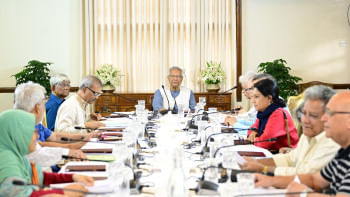No int'l laws applicable in war trial
The defence of Salauddin Quader Chowdhury yesterday said no international laws would be “applicable” in the case against their client as he was being tried by a domestic tribunal under domestic laws.
Ahsanul Huq Hena, a defence counsel of the war crimes accused BNP lawmaker, also said the prosecution's submission citing international laws wouldn't be “fruitful” in this case.
Hena made the submission while placing closing arguments in the case for the fifth day before the International Crimes Tribunal-1. The defence were asked to complete their arguments within the first half of today.
The three-member tribunal led by Justice ATM Fazle Kabir also asked the prosecution to give a reply in response to the defence arguments on the second half. Earlier, the prosecution placed their arguments.
As per relevant laws, the tribunal would either keep the case waiting for verdict or fix a date for declaring the judgement on completion of the closing arguments from both the prosecution and the defence.
Citing from an earlier order of the tribunal that mentioned it as a domestic tribunal, Hena said all laws and rules, judges, defence counsels and prosecutors were domestic.
“So no international laws would be applicable in the case [against Salauddin],” Hena argued.
However, section (3) (2) of the International Crimes (Tribunals) Act, 1973 empowers the tribunal to deal with crimes against humanity, crimes against peace, genocide, war crimes, violation of any humanitarian rules applicable in armed conflicts laid down in the Geneva Conventions of 1949, attempt to commit such crimes and complicity to prevent such crimes.
According to section 3 (2) (f) of the Act, the tribunal has the jurisdiction to deal with “any other crimes under international law.”
But, Hena said his client was not charged under section 3 (2) (f), so no international laws would be applicable to try him.
During their arguments, the prosecution citied several international laws and instances of other war crimes trial abroad.
Hena said it was an admitted fact that hearsay witnesses had probative value, but to make the testimony of a hearsay witness admissible, the persons, who gave information to the hearsay witnesses, must be testified before the court.
Later, Hena placed his arguments on several charges citing testimonies of the prosecution witnesses and showed “contradictions” to discredit their testimonies.
At one point of his submission, Hena claimed the prosecution could not improve the case by tendering “false” witnesses rather “damaged” the case, which itself was “false.”
Earlier on Wednesday, the tribunal asked the defence to complete their arguments within yesterday and in the beginning of yesterday's proceeding reminded them of the deadline.
But when Hena sought more time at 4:15pm, the tribunal expressed discontent and said, “You [the defence] were unwilling to complete [your submission] within the deadline.”
SQ Chowdhury, who is facing 23 charges of crimes against humanity committed during the Liberation War in 1971, sought two more days to complete argument from the dock. But before his plea, the tribunal asked his counsels to compete arguments within first half of today.
ICT-2
The government, as per a nomination of Chief Justice Md Muzammel Hossain, yesterday appointed Justice Md Shahinur Islam as the member of the International Crimes Tribunal-2.
Justice Shahinur was a member of the tribunal but was later appointed as an additional judge of the High Court on July 31 and took the oath on August 5. One post of the tribunal had remained vacant after he joined as an HC judge.

 For all latest news, follow The Daily Star's Google News channel.
For all latest news, follow The Daily Star's Google News channel. 



Comments